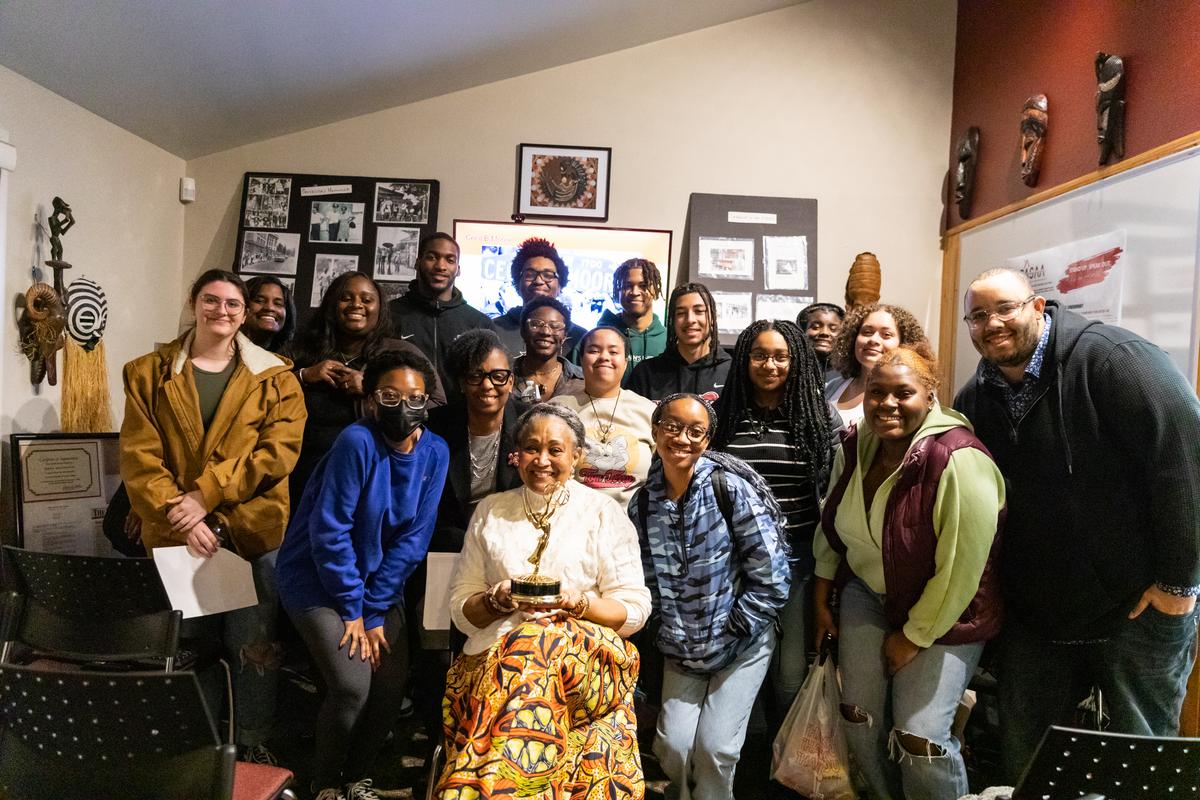Freedom Fighter Bernyce Mills DeVaughn Speaks at Black Affinity Living and Learning Black Philadelphia Mini-Lesson

On Thursday, February 23, the Black Affinity Living and Learning Community and the office of Access, Equity, Diversity, and Inclusion hosted Emmy Award Winner Ms. Bernyce Mills DeVaughn.
Ms. Bernyce Mills DeVaughn was amongst one of the many young Freedom Fighters who worked to integrate Girard College in 1965. Girard College, founded by philanthropist Stephen Girard, is a boarding school founded for “poor white males,” located on 8 acres in North Philadelphia, the center of a thriving Black community. At its inception, Girard College was considered an innovative institution for education, however, African American boys were denied admission. DeVaughn was one of the many youth who helped Cecil B. Moore, a pillar of the community, contest Girard’s will to allow black students to attend the school.
Hailing from Norfolk, VA, Ms. Bernyce moved to Philadelphia when she was young and attended Simon Gratz High School. Her activist beginnings started in Virginia when she would sell peanuts out of her father’s truck with her sister and donate their earnings towards bail for those who were jailed for protesting. Upon relocating to Philadelphia, she moved from funding marches to actively marching at protests with the Freedom Fighters under Cecil B. Moore.
Ms. DeVaughn was invited to the finale event for the Black Philadelphia Mini-Lesson held by Dr. Angela McNeil, Assistant Vice President of Access, Equity, Diversity, and Inclusion at the CASAA House. She arrived and brought in many personal photographs that documented the time period in which she was a part of the march on Girard College. She also displayed her Emmy from her appearance in the documentary film, Cecil’s People:The Freedom Fighters. As she spoke, she held everyone’s attention with her story as she stated “I want this to be informal. Sort of like a conversation.” Coupled with the images of that time, Ms. DeVaughn went on to tell her story, taking the students of 2023 and putting them into the time of Philadelphia’s 1960s.
It could be said that ‘connecting the past with the present’ is more than a term but is a reflection of an extraordinary moment taking place during the mini series event. A member of the audience was a direct recipient of integration efforts by Ms. DeVaughn and Freedom Fighters. Zion Perry ‘26 is an Arcadia student whose mother attended Girard college as a youth. She shared her story and her gratitude towards Ms. DeVaughn, acknowledging the work of those who paved the way, providing her an otherwise impossible opportunity.
Historically,the North faced a de-facto segregation, rather than the South’s more judicial form of segregation. But, this was 1965. Girard College was an all-white school in a majority black neighborhood. The contesting of Girard’s will was to rectify the right of integrated schools after Brown v. Board. Though Philadelphia was a progressive area, the city still endured the social imbalance that was brought on by Jim Crow’s national influence.
Cecil B. Moore was an agent for change in his city. Like SNCC (Student Nonviolent Coordinating Committee) and SCLC (Southern Christian Leadership Conference), the Freedom Fighters were youth protesters who challenged segregation head-on. Cecil B. Moore was a voice for the people and led his chapter of the NAACP like the army, due to his military background. He was instrumental in Black workers obtaining blue collar jobs. Formerly known as Columbus Boulevard, a group of former freedom fighters rallied to change the street name to Cecil B. Moore Ave., a street that stretches across North Philadelphia.
Ms. Bernyce Mills Devaughn was on the front lines, at just 16 years old. As a high school student, she was fighting for a greater cause. She said that before she participated in protests, she had to complete her responsibilities such as homework and chores on her parents’ orders. Right after she finished her assignments, she went to protest. While she shared many experiences with sit-ins, she spoke pointedly about being arrested, placed in a very dirty paddy wagon with hands chained and thrown in jail. Not long after, Cecil B. Moore, outraged at the arrest, cursed the administration for locking up children, and bailed them out. During this entire episode, she and her peers never stopped singing freedom songs.
During her 7 months and 17 days on the frontlines at the battle of Girard College, she witnessed her sister get attacked and arrested for protesting. She, too, had her share of run-ins with the law, but remained fearless through her tears. Ms. DeVaughn shared her photographs with the students that documented the police standing on guard at the walls of Girard and Cecil B. Moore’s Young Militants.
DeVaughn was a proud soldier and Cecil B. Moore was the captain of the Freedom Fighters. She bridged the connection between her generation and ours, sharing how she emulated her fashion after Civil Rights activists like Miriam Mekeba.
In her closing remarks, Ms. DeVaughn had stated that she would have never thought her actions would have gotten her to the place that she is today, speaking to colleges and schools about her experience. Her experience was to make a difference. Ms. Berynce Mills DeVaughn’s testament was a fearless one and it instills the values of advocacy and action. At the end of her story, she soulfully sang the freedom song “We Ain’t Gonna Let Nobody Turn Us Around” and her own rendition “Cecil Won the Battle at Girard College”.
Cecil Won the Battle At Girard College
Girard College
Girard College
Cecil Won the Battle at Girard College
And the Walls Came Tumbling
Down


